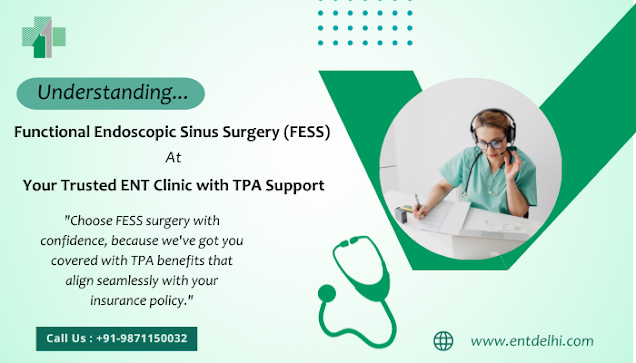Functional Endoscopic Sinus Surgery, commonly known as FESS, is a minimally invasive surgical procedure used to treat various sinus-related conditions. This technique allows a surgeon to treat sinus issues without the need for external incisions. Instead, they use an endoscope, a thin, flexible tube with a camera, to access and treat sinus passages. FESS is primarily designed to improve sinus drainage and alleviate chronic sinus problems.
FESS is typically recommended for individuals who suffer from chronic or recurrent sinus issues that do not respond well to other forms of medical treatment. Common conditions that may warrant FESS include chronic sinusitis, nasal polyps, sinus blockages, and certain sinus-related complications. It is often considered when symptoms significantly impact a person’s quality of life.
Process of Functional Endoscopic Sinus Surgery:
The process of FESS involves several key steps, including considerations for insurance coverage:
- Consultation with a FESS Surgeon: Patients who are candidates for FESS start by consulting with an experienced FESS surgeon or an otolaryngologist (ear, nose, and throat specialist). During this consultation, the surgeon assesses the patient’s medical history and the severity of their sinus condition. They discuss the potential benefits, risks, and expected outcomes of the surgery.
- Selecting the Best Clinic for FESS surgery: Choosing the right clinic or hospital for FESS is crucial. Patients should look for facilities that specialize in sinus surgery and have a reputation for successful FESS procedures. The selection of the best FESS clinic often involves researching the credentials and experience of the medical team.
- Contacting the Insurance Company: Patients should reach out to their insurance company to understand the coverage related to FESS. It is essential to inquire about specific details, such as whether FESS is covered, the extent of coverage, deductibles, and copayments. Additionally, check if the chosen FESS clinic is in-network, as this can significantly impact the insurance coverage.
- Health Policy and Cashless FESS: Understanding the health policy is crucial in making informed decisions. If the health policy covers FESS, patients may have the option for a cashless procedure. In a cashless setup, the clinic or hospital directly bills the insurance company, minimizing out-of-pocket expenses. Ensure that the chosen FESS clinic is part of the insurance network to benefit from cashless services.
- Pre-Surgery Evaluation: Before the FESS surgery, a comprehensive pre-surgery evaluation is conducted. This evaluation includes various assessments, such as physical examinations, imaging tests (like CT scans), and blood work, to ensure the patient’s suitability for the procedure.
- The Surgery Itself: FESS is performed under general or local anesthesia, depending on the complexity of the case. The surgeon inserts the endoscope into the nasal passages, guiding it to access and treat the affected sinuses. The endoscope provides a clear view of the sinus structures, allowing the surgeon to remove polyps, clear blockages, and improve drainage.
- Recovery: Following FESS, patients typically spend a short time in a recovery area. They may experience mild discomfort, congestion, and nasal drainage. Post-operative care instructions are provided to manage these symptoms effectively.
- Post-Surgery Follow-up: Patients are scheduled for follow-up appointments with the FESS surgeon to monitor their recovery and ensure that the surgery’s objectives have been met.
In summary, Functional Endoscopic Sinus Surgery (FESS) is a minimally invasive procedure used to treat chronic sinus conditions. It is recommended for individuals with persistent sinus problems. The process involves consulting with a specialist, selecting the right clinic, understanding insurance coverage, and considering cashless options if the clinic is in-network. FESS is performed with the aid of an endoscope, and patients will have a recovery period and post-operative follow-up appointments to ensure the success of the surgery. Understanding your health policy is vital to making informed decisions about FESS.

